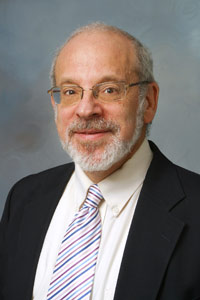Borsuk Honored for “Building a Better Teacher” Series
 Alan J. Borsuk, senior fellow in law and public policy at the Law School, was named a winner Monday in a major national education journalism competition. Borsuk was honored for his role in the project, “Building a Better Teacher,” which ran on the front page of the Milwaukee Journal Sentinel for eight consecutive Sundays in November and December.
Alan J. Borsuk, senior fellow in law and public policy at the Law School, was named a winner Monday in a major national education journalism competition. Borsuk was honored for his role in the project, “Building a Better Teacher,” which ran on the front page of the Milwaukee Journal Sentinel for eight consecutive Sundays in November and December.
The Education Writers Association, a national organization of education journalists, named the project the best series of 2010 by a large publication. The series resulted from collaboration between the Law School; the Hechinger Report, an education journalism organization that is part of Columbia University; and the Journal Sentinel, including reporters Amy Hetzner, Erin Richards, and Becky Vevea.
Borsuk helped design the plan for the series and wrote three of the eight pieces. Borsuk, a longtime reporter and editor for the Milwaukee Journal and Milwaukee Journal Sentinel, joined the Law School staff in 2009. He writes and edits pieces for Marquette Lawyer magazine, writes for the Law School’s web pages, and is involved in a variety of public policy activities. He also writes a Sunday column on education for the Journal Sentinel.
The education writers’ contest is judged by experts who are independent of the publications that enter. This year’s judging was directed by Tamara M. Cooke Henry, of the Philip Merrill College of Journalism at the University of Maryland.
The series can be found at http://www.jsonline.com/news/education/111494694.html.
Rethinking Indeterminate Sentencing
My new article, “Beyond Rehabilitation: A New Theory of Indeterminate Sentencing,” is now available here on SSRN. The article grew out of my interest in the revival of early-release opportunities that has occurred over the course of the past decade. This revival has the effect of making sentencing less determinate in many jurisdictions — it is not as clear at the time the judge pronounces the sentence exactly how long the defendant will spend in prison. It is commonly assumed that indeterminate sentencing is incompatible with retributive approaches to punishment, particularly to the extent that the amount of incarceration is made to depend on considerations other than the gravity of the crime (for instance, on the defendant’s performance while in prison).
My purpose in the article is suggest one way that indeterminate sentencing may be reconceptualized so that it fits tolerably well with at least one version of retributivism. In essence, an indeterminate sentence is seen as a way to permit limited extensions of incarceration as a retributive response to persistent, willful violations of prison rules. Were this approach adopted, however, it would probably require a rethinking not only of the way that parole is administered, but also the way that prisons are run. If prisons are, in practice, little more than warehouses — places of intense exclusion that aim to provide no more than the bare necessities for physical existence — then it is not clear there is a morally satisfactory basis for retributive responses to prison rule-breaking.
The article is forthcoming in the American Criminal Law Review. The abstract appears after the jump.

